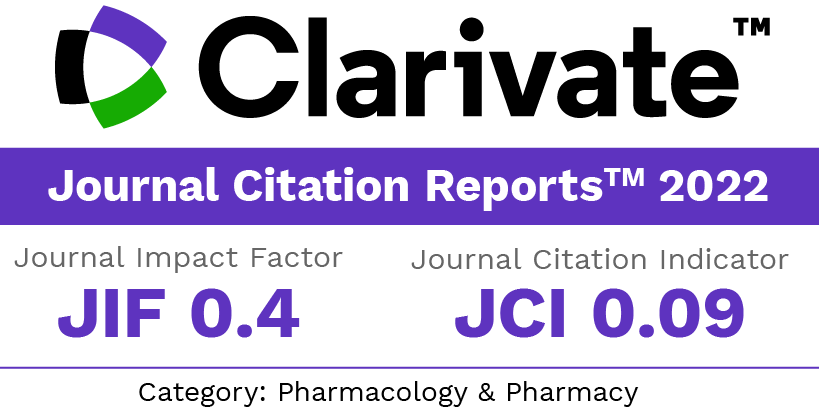The effect of written information provided by pharmacists on compliance with antibiotherapy
Keywords:
Therapeutic compliance, Antibiotherapy, Pharmaceutical care, contradict appropriate antibiotic administration policiesAbstract
Non-compliance with therapeutic guidelines represents a potential public health risk, given that it contributes to bacterialresistance. One of the strategies used to improve compliance to such guidelines is to provide the patient with betterinformation in written form. The objectives of the present investigation were the following; To evaluate the influencethat written information, provided by the community pharmacist, has on compliance with antibiotic therapy, to verify theconsequences of degree of compliance on patient health, and to discover other factors influencing patient compliance.The experimental study was carried on patients that attend a community pharmacy for antibiotic prescriptions. Membersof the control group were given information in verbal form only, while members of the experimental group were giventhe same information in both verbal and written form. The degree of compliance was determined through telephoneinterviews, carried out the day after having finished treatment. 214 patients completed the study. A 14% increase incompliance among members of the experimental group was achieved. Patients that had completed treatment, had a betterperception of their own health than those that had not. Another factor found to have a significant influence oncompliance was the number of daily dosages.In conclusion, the written information provided by the pharmacist improves therapeutic compliance. Therapeutic complianceimproves patients’ perception of their state of health. The number of daily dosages also have an influence to bear, butcontradict appropriate antibiotic administration policies.Downloads
References
Haynes RB, Taylor DW, Sackett DL. Compliance in health care. The John Hopkins University Press: Baltimore, MD;
Feldman JA, DeTullio PL. Medication noncompliance: an issue to consider in the drug selection process. Hosp Formul
; 29: 204- 211.
Ramalle- Gomara E, Bermejo- Ascorbe R, Alonso Marín R, Marino Alejo I, Sáenz de Cabezón Bustunduy MI, VILLARO
Amilburu c. Cumplimiento del tratamiento antibiótico en niños no hospitalizados. Aten Primaria 1999;24: 364- 367.
Gérvas J. La resistencia a los antibióticos, un problema de Salud Pública. Economía y Salud 1999; 35: 1-7.
Grupo URANO. Cumplimiento e incumplimiento terapéutico en el tratamiento antibiótico. Madrid: Doyma; 1997.
Sociedad Española de Quimioterapia. Estudio sobre el uso de los antibióticos en España. Madrid: Pfizer; 1994.
Abrahams J. Patient compliance in general practice. Australian Family Physician 1977; 6: 1200- 1205.
Álvarez de Toledo F, Arcos González P, Cabiedes Miragaya L. La nueva Atención Farmacéutica: ¿puede la intervención
farmacéutica mejorar la eficiencia terapéutica?. Rev Esp Salud Pública 1995; 69: 277- 282.
Piscitelli Sc, Occhipinti DJ, Danzinger LH, Hill C, West DP, Fischer JH. Therapeutic monitoring and pharmacist
intervention in a Hansen´s disease clinic. Ann Pharmacother 1993; 27: 1526- 1531.
Van Berge Henegouwen MTH, van Driel HF, Kasteleijn- Nost Trenité DGA. A patient diary as a tool to improve
medicine compliance. Pharm World Sci 1999; 21 (1): 21- 24.
Salar L, Dualde E, Bernardeau E, García Cebrián F. Programa TOD (Tratamiento de Observación Directa) de Valencia.
Implantación y experiencia iniciales. Pharm Care Esp 2000; 2: 28- 41.
Consejo Geeral de Colegios Oficiales de Farmacéuticos. Catálogo de Especialidades Farmacéuticas 1998. Madrid:
CGCOF; 1998.
Cockburn J, Gibberd RW, Reid AL, Sansón- Fisher RW. Determinants of non- compliance with short- term antibiotic
regimens. BMJ 1987; 295: 814- 818.
Zinder DE, Castro KG. The global treta of drug- resistant tuberculosis. N Engl Med 1998; 338 (23): 1689- 1690.
Bergman U, Wiholm E. Patient medication on admisión to a Medical Clinic. Eur J Clin Pharmacol 1981;20: 185- 191.
Haynes RB, McKibbon KA, Kanani R, Brouwers MC, Oliver T. Interventions for helping patients to follow prescriptions
for medications (Cochrane Review . In: The Cochrane Library, Issue 1, 1999. Oxford: Update Software.
Martínez Ibáñez MT, Hernández González E, Méndez García CD, Gómez Juárez JL, Salas Hospital JC, Vázquez
Velosos C, Solsona Gimeno R. Comparación de los métodos de encuesta: teléfono frente a correo en la población
diabética de un centro de salud. Aten Primaria 1999;23: 198- 203.
Sociedad Española de Quimioterapia. Estudio sobre el uso de los antibióticos en España. Madrid: Pfizer; 1994.
Morris LA, Halpering JA. Effects of written drug information on patient knowledge and compliance: a literature review.
Am J Pharm 1979;69 (1): 47- 52.
Cabezas A, Martín E, Comín J, Sabría C, Boix A, Espínola E et al. Cumplimiento terapéutico en Atención Primaria
de Salud. Valor de la receta personalizada. Rev Clin Esp 1989; 185: 360- 363.
Beardon PHG, McGilchrist MM, McKendrik Ad, McDevitt DG, MacDonald TM. Primary Non- compliance with
prescribed medication in primary care. BMJ 1993;307: 846- 848.
Rashid a. Do patients cash prescriptions ?. BMJ 1982; 284: 24- 26.
Taquín PA, Stringer RS, Duffy JB, Elion C, Ferraris CS, Misrachi SR, Shenfield GM. The influence of information
provided by patients on the accuracy of medication records. Med J Aust 1998; 169 (2): 85-88.
Matsumoto K, Nishikawa M, Hashimoto H, Hayakawa H, Chida K, Toyoshima M, Satoh A. Effect of pharmacist´s
instruction on treatment of ashmatics with inhaled steroid. Aerugi 1998; 47 (4): 404-412.
Michael KA, Henderson PL, Newman RB, Blackwelder EN, Caldwell RD. Impact of a pharmacist/ physician cooperative
target drug monitoring program on prophylactic antibiotic prescribing in Obstetrics and Gynecology. Hosp
Pharm 1992; 27: 213- 216.
Al- Shammari SA, Khoja T, Al- Yamani MJMS. Compliance with short- term antibiotic therapy among patients
attending primary health centres in Riyadh, Saudi Arabia. J Roy Soc Health 1995; (4): 231- 234.
Reiter Consulting y Gestión. Cumplimiento del tratamiento. Claves económicas de un problema sanitario. Estudio
preliminar. Madrid; 1995.
Urquhart J. Patient non- compliance with drug regimens : measurement, clinical correlates, economic impact. Eur Heart
J 1996 ; 17 (Suppl A) : 8- 15.
Pullar T, Birtwell AJ, Wiles PG, Hay A, Feely MP. Use of a pharmacologic indicator to compare compliance with
tablets prescribed to be taken once, twice, or three times daily. Clin Pharmacol Ther 1988; 44: 540- 545.
Eisen SA, Miller DK, Woodward RS, Spitznagel E, Przybeck TR. The effect of prescribed daily dose frecuency on
patient medication compliance. Arch Intern Med 1990; 150: 1881- 1884.
Roe CM, Motheral BR, Teitelbaum F, Rich MW. Angiotensin- Converting Enzyme Inhibitor compliance and dosimg
among patients with heart failure. Am Heart J 1999; 138 (5): 818- 825.
Garret SS. Deciding between once- and twice- daily dosing. Am J Health- Syst Pharm 1996; 53: 730- 731.
Cramer JA. Relationship between medication compliance and medical outcomes. Am J Health- Syst Pharm 1995; 52
(Suppl 3): S27- 29.
Prados Castillejo JA. Importancia de la relación médico- enfermo y la entrevista clínica en el cumplimiento del
tratamiento. Inf Ter Sist Nac Salud 1992; 16: 209- 216.
Lewis RK, Lasack NL, Lambert BL, Connor SE. Patient counselig- a focus on maintenace therapy. Am J Health- Syst
Pharm 1997; 54: 2084- 2098.
Downloads
Published
How to Cite
Issue
Section
License
The articles, which are published in this journal, are subject to the following terms in relation to the rights of patrimonial or exploitation:
- The authors will keep their copyright and guarantee to the journal the right of first publication of their work, which will be distributed with a Creative Commons BY-NC-SA 4.0 license that allows third parties to reuse the work whenever its author, quote the original source and do not make commercial use of it.
b. The authors may adopt other non-exclusive licensing agreements for the distribution of the published version of the work (e.g., deposit it in an institutional telematic file or publish it in a monographic volume) provided that the original source of its publication is indicated.
c. Authors are allowed and advised to disseminate their work through the Internet (e.g. in institutional repositories or on their website) before and during the submission process, which can produce interesting exchanges and increase citations of the published work. (See The effect of open access).


















